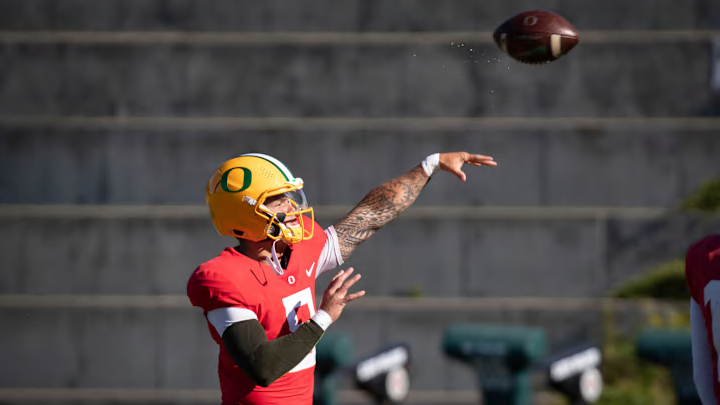There are 22 players on the football field at any given time.
A handful of linemen (both offensive and defensive), wideouts and defensive backs, a running back or two, some linebackers, and maybe a couple of tightends.
But the one position that makes it all click?
Face the facts
Let's be honest. Can you name a top-tier college football program that doesn't have an elite quarterback at the center of everything?
Georgia has Carson Beck. Ohio State has Will Howard. Oregon has Dillon Gabriel. Texas has Quinn Ewers. Alabama has Jalen Milroe.
I spoke to USA Today's national college football writer Paul Myerberg and we tended to agree.
"If you don't have a quarterback, there's no reason to talk about you," Myerberg said. "One thing that I look at about picking teams is 'tell me about your quarterback. You look at teams one through six, elite quarterbacks, all of them."
Every single highly-ranked college team has a five-star quarterback taking the snaps.
What about everyone else?
Even if the running back is average, the offensive line has some gaps, and the wideouts are below par, an excellent quarterback can make a mid-tier team great.
Take the Texas Longhorns for example.
The Horns are losing running backs left and right, and they lost their elite wideouts Xavier Worthy, Adonai Mitchell, and Jordan Whittington to the NFL.
However, with Quinn Ewers at the helm, Texas' offense is still supposed to be one of the best in the country this season.
Another example is Oregon.
The Ducks lost their No. 1 receiver Troy Franklin and their No. 1 running back Bucky Irving to the NFL. Not to mention, Oregon lost their starting center so the offensive line is going through a rebuilding period.
Yet, everyone is on the hype train for the Ducks' offense because head coach Dan Lanning brough in Heisman-favorite Dillon Gabriel.
What has changed in college football?
Everything.
No, actually.
Players can transfer from one program to the next. College athletes are making money. There are only four power conferences. Coaches have a direct line to one player on the field with in-helmet communications. The College Football Playoffs now include 12 teams.
College football looks entirely different than it did just half a decade ago.
"College football wasn't always that way. Clearly you weren't going to win with a Trent Dilfer playing QB in college football but you were able to build successful programs," Myerberg said.
Take early-Nick Saban Alabama for example.
The Crimson Tide took down the Texas Longhorns in the 2009 National Championship game, most people remember that Colt McCoy was Texas' starting QB but a whole lot of college football fans can't name the Alabama quarterback at the time.
It was Greg McElroy, by the way.
At the end of the day, of course quarterbacks need every single player around them and of course a team's quarterback isn't any help when its defense is on the field.
However, an elite quarterback is necessary to have an elite team.
A program can have a mediocre running back and an okay defensive line and mid-tier wide receivers.
However, a below-average quarterback will lead to a team's ruin quicker than any other position on the field.
